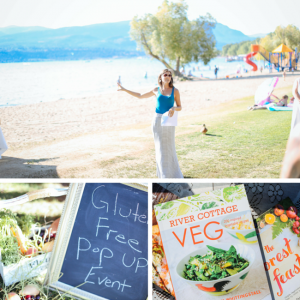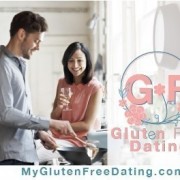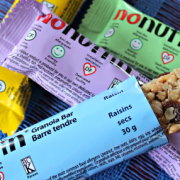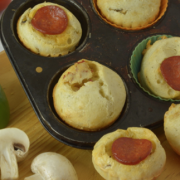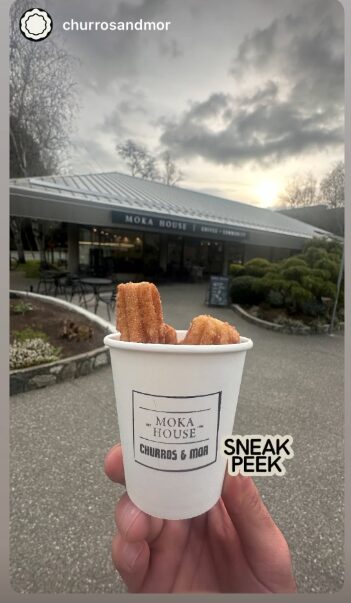10 Communication Strategies to Decline Gluten-Free Food by Selena De Vries, RD
Having to turn down well-intentioned family member’s gluten free food or interrogate family members or friends on the ingredients used to make a gluten free dish, is by far, the most dreaded conversation a celiac will encounter. Am I right? I know this topic tops the list for me, hands down, for sure.
 About Selena De Vries, RD
About Selena De Vries, RD
- Selena is a Registered Dietitian living with celiac disease who helps individuals that struggle with digestion find food freedom. At Healthbean Nutrition, Selena understands that celiac disease not only effects our physical health but also effects our emotional health. As such, Selena uses an integrative approach in the management of digestive health conditions. She offers free group support for those with celiac disease/gluten sensitivity as well as offering nutrition coaching for digestive health conditions. Services are offered both online and in the beautiful Okanagan valley.
Get Selena’s Top 21 Simple and Energizing, Gluten Free Snack Ideas Delivered to Your Email!
It’s awful when friends or family have put in so much time and effort and then you find out that you need to tell them that, unfortunately, you cannot eat it. You know you need to decline the food item for your health, but coming up with the right communication can be very difficult.
Here are 10 communication strategies you can use to politely decline risky, gluten-free food.
Situation #1: Potluck dinner or BBQ with friends stating “oh yes, it is gluten free. Not to worry, you can have some” or “This is gluten free, you need to try it!”
- Communication strategy #1: “Thanks. It certainly looks good.” Or, “Yes, it does look delicious!” (bypass the whole celiac conversation, and keep walking past the food item or get up and leave your current location and grab a glass of water or drink and go back to your spot.)
I use this strategy ALL the time. Sometimes, I don’t want to talk about celiac. I get sick of always having to talk about cross contamination and the importance of the GF diet. I know you guys can relate too!
- Communication strategy #2: “I have celiac disease and even tiny, tiny crumbs of gluten can make me very ill. I have a (insert family function or work event) tomorrow and I really can’t afford to be sick for it. But, thank you!”
- Communication strategy #3: “I have celiac disease and food even cooked on the same surface or cut on the same surface as gluten containing food is enough to make me very sick for days. So, I’d rather not chance it. It certainly does look good though!”
Situation #2: Family lunch/dinner made by family members/friends who do not take celiac and the gluten free diet seriously.
- Communication strategy #1: “I brought my own meal and/or ate before as I got quite sick last time and it took me a few days to get back to feeling like my old self (you can say this even if you do not develop typical symptoms). I’m happy to just come see you guys and catch up on visiting! Next time, we should do the dinner at my place. Would you be interested in coming over and helping me make the dinner?” If they agree, it is a good chance to help provide education on the GF diet and introduce them to some of your favourite GF products.
- Communication strategy #2: “We actually can’t make it on (insert date of family dinner event). We are free, however (insert another date). How about we do the dinner at our place instead at (insert time). It would be great if you can come over and help make it too. Are you available? If not, we will see you on (insert date and time).” If they agree, it is a good chance to help provide education on the GF diet and introduce them to some of your favourite GF products.
- Communication strategy #3. “You can think of celiac disease like a peanut allergy but with gluten instead. The difference is that you can visibly see the reaction with a peanut allergy. With gluten, you cannot see the severity of the reaction from the outside, but it’s still doing the damage on the inside. It’s hard to wrap your head around it, if you can’t see it, I know. But, as you can imagine, I really can’t take the chance with residual amounts of any gluten crumbs and I just can’t risk it.”
- Communication strategy #4: “We can’t make it, unfortunately. But, we are doing a games night on (insert date) (or see this post on other activities you can do with family and friends that do not involve food). We would love to have you, can you make it?”
- Communication strategy #5: “We can’t make the dinner as we are busy until (insert time). But, are you guys playing cards or going for a walk after dinner like you usually do? Because I think our event will be over by (insert time) and we could pop by after for a bit.”
Situation #3: Friend made you a GF baked item for your birthday.
- Communication strategy #1: “Thanks. It looks delicious!” (Bring it home and give it to your non-celiac family members).
- Communication strategy #2: “Celiac is like another level of gluten free. It goes beyond gluten free ingredients and includes avoiding cross contamination with things like using dedicated baking equipment and, often, a fully gluten free kitchen. It can be overwhelming even to me! So, I certainly don’t expect others to bake that way for me. But, I definitely appreciate the effort. Thank you so much!
Do you have other communication strategies that you use? Let’s hear them in the comments section!
Living in the Okanagan or anywhere in British Columbia? View Selena’s services or book an appointment!
- Contact Selena for in-person or on-line support
- HealthBean.ca • Facebook • Twitter • Instagram • Pinterest • Videos • Blog
- [email protected] • 1-778-990-6047
Testimonial
- “I contacted Selena when I still wasn’t feeling well a year after my celiac diagnosis. I’d read so much on the Internet I thought I knew everything I needed to know. I was wrong.
- Selena has important advice on how to do GF properly (it’s not as straightforward as I thought) and for regaining your health. She is organized, punctual, and professional. And she has celiac disease herself , so she gets it.
- I think a lot of us, by the time we’re diagnosed, have had more than our share of health care practitioners and may not want to bother with a dietitian.
- Selena played a crucial role in my recovery, and I would highly recommend her, whether you’re newly diagnosed or just trying to feel better.”
- ~ Charlene (long-distance celiac disease client)
- HEALTHBEAN NUTRITION specializes in digestive health. We deliver easy to digest, bite-size pieces of information so our clients can, finally, achieve the healthy & happy digestive system they’ve been striving for. Learn more ...
- HEALTHBEAN PHILOSOPHY– Selena employs elimination diets and/or a specific diets in accordance with her clients’ conditions, and only when deemed necessary. She reserves advice about the gluten-free diet for those who require it – not those choosing to follow the diet as a lifestyle choice. Expect clear, concise instructions on the appropriate diet for you and, maybe even some myth busting! Learn more …
Selena knows first-hand how her undiagnosed celiac disease affected her physical and emotional health. After telling her that, “Well, you have celiac disease,” her MD suggested she, “google the diet,” and out the door she went. Sound familiar?
That’s why Selena established Healthbean Nutrition. She is dedicating her education, personal insights and her own recovery to helping her fellow celiacs make this enormous lifestyle transition – and find joy in eating again! Learn more …
Selena’s Road to Diagnosis
- “When I was going through university, I was exhausted, ALL the time. I had to drag myself out to hang out with friends, and if I had it my way I would have spent most days in bed sleeping. It was not unknown for me to sleep 12-16 hours a day. Call me crazy, but I related it all to the busy-ness of school. I was even checked for anemia at one point (common with celiacs) and I was ‘fine.’
- The symptoms continued through school and the brain fog was undeniable. I distinctly remember during my dietetic internship (like a medical residency except everything is nutrition based) at Kelowna General Hospital sitting in the office, charting on a patient and, literally, feeling like my brain was so fuzzy that I could barely keep my eyes from nodding off. It was awful.
- Another thing I didn’t pay much attention to, was bowels. I was always constipated. Never the other way around. Never. And, I also remember mentioning this to my gastroenterologist just before the endoscopy and he said ‘oh, well with your very low antibody levels and constipation, there is a very low chance that you are actually celiac but we will proceed with the endoscopy since you’re prepped and ready to go.’
- The piece of paper I received after the endoscopy said to follow up with my GP. I did follow up with my GP and the report came back positive for celiac disease. My GP said “well, you’re celiac. But, you’re a dietitian, right, so this should be easy for you!”
- Perhaps I had a leg up in the nutrition part of it, but I think we all know that the gluten free diet is not a walk in the park. And, although, I am so appreciative of the medical care I received, it did open my eyes to the lack of knowledge within the medical community when it came to celiac disease and the lack of support offered to individuals with celiac disease.
That’s how Healthbean Nutrition was born!
Leave a comment at the bottom of the page.
- *Information and perspectives posted on The Celiac Scene are intended to provide general information, without independent verification on the part of The Celiac Scene for the accuracy of the information provided to it. The information is specifically not intended to be a substitute for medical diagnosis or treatment by your physician or other health care professional. Always consult your own physician or other health care professionals about any medical questions, diagnosis, or treatment, especially before trying any diet. Healthbean Nutrition does not accept any liability for any injury, loss or damage incurred by use of or reliance on any content contained herein.


